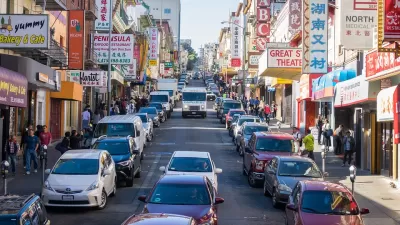An opinion piece by Josh Wilson makes a case for a congestion pricing plan tailored specifically for the realities of living and working in San Francisco.

"Safer streets, less pollution, better transit, bustling business districts — San Francisco can have it all," writes Josh Wilson to open an opinion piece published recently by the San Francisco Chronicle.
But like many other cities around the state and the country, increased amounts of driving and reduced transit ridership are producing congestion, carbon emissions, and air pollution. "Something needs to change, and somebody has to pay," concludes Wilson. "Congestion and zone pricing offer a path forward."
Interestingly, Wilson brackets land use as a means to the solutions sought by congestion pricing by mentioning the political and bureaucratic quagmire of planning and development policy in the city: "One solution is to build around transit rather than automobiles, but that process is bogged down in the eternal battle between preservationists and pro-density developers. We need to raise the stakes while they get their issues sorted out."
A key theme throughout the opinion piece is the specificity of the proposed congestion pricing plan. The proposal targets specific streets, with specific concession made for certain kinds of drivers, and concern for specific outcomes that could be desired less desirable consequences of a congestion pricing scheme.
As noted by Wilson, "touristy Lombard Street and hustling, bustling Market Street" are under consideration as test cases for congestion pricing, following in the footsteps of New York City in implementing a transportation policy previously only encountered in European cities. The Overton window for congestion pricing has also opened in other U.S. cities like Chicago, Seattle, and Los Angeles in recent months.
FULL STORY: San Francisco needs congestion pricing — and not just for downtown driving

Alabama: Trump Terminates Settlements for Black Communities Harmed By Raw Sewage
Trump deemed the landmark civil rights agreement “illegal DEI and environmental justice policy.”

Study: Maui’s Plan to Convert Vacation Rentals to Long-Term Housing Could Cause Nearly $1 Billion Economic Loss
The plan would reduce visitor accommodation by 25% resulting in 1,900 jobs lost.

Planetizen Federal Action Tracker
A weekly monitor of how Trump’s orders and actions are impacting planners and planning in America.

Wind Energy on the Rise Despite Federal Policy Reversal
The Trump administration is revoking federal support for renewable energy, but demand for new projects continues unabated.

Passengers Flock to Caltrain After Electrification
The new electric trains are running faster and more reliably, leading to strong ridership growth on the Bay Area rail system.

Texas Churches Rally Behind ‘Yes in God’s Back Yard’ Legislation
Religious leaders want the state to reduce zoning regulations to streamline leasing church-owned land to housing developers.
Urban Design for Planners 1: Software Tools
This six-course series explores essential urban design concepts using open source software and equips planners with the tools they need to participate fully in the urban design process.
Planning for Universal Design
Learn the tools for implementing Universal Design in planning regulations.
Caltrans
Smith Gee Studio
Institute for Housing and Urban Development Studies (IHS)
City of Grandview
Harvard GSD Executive Education
Toledo-Lucas County Plan Commissions
Salt Lake City
NYU Wagner Graduate School of Public Service





























